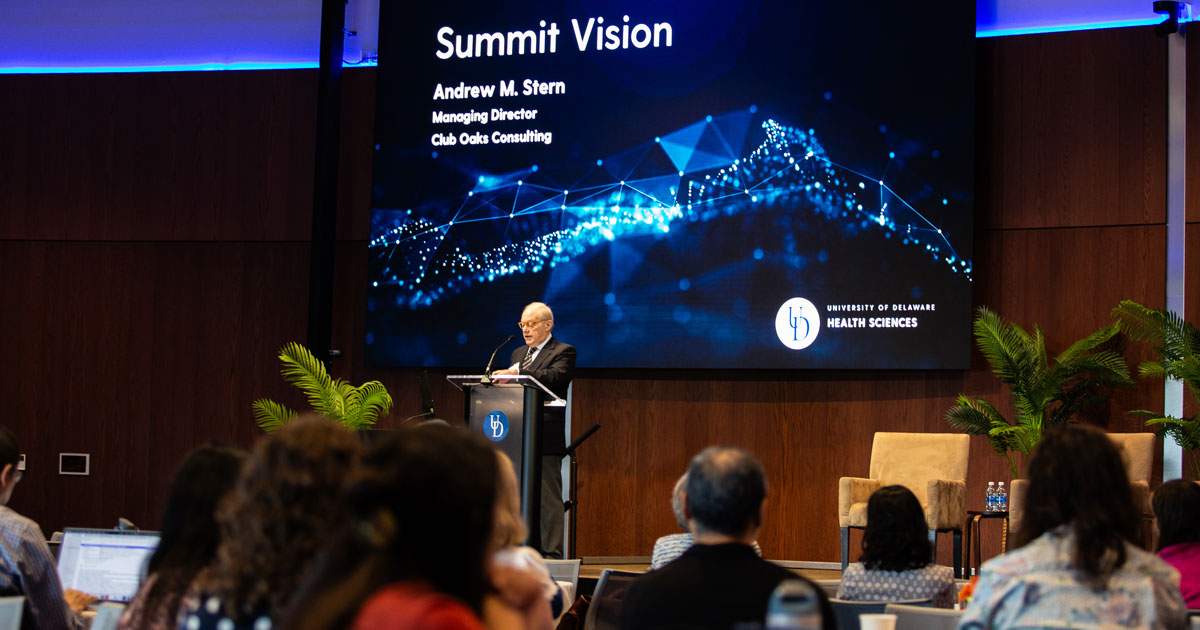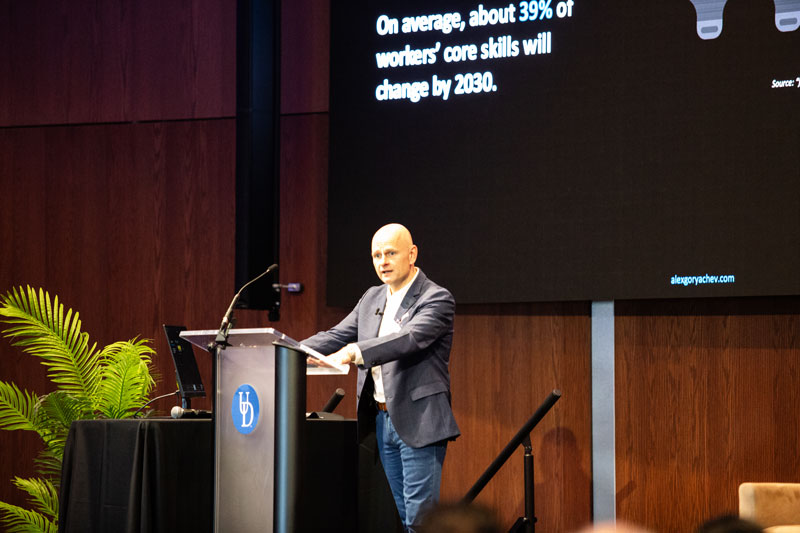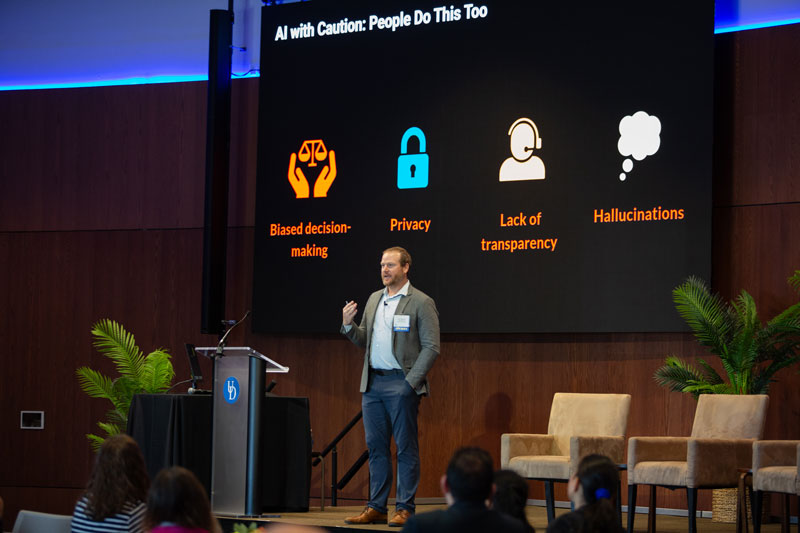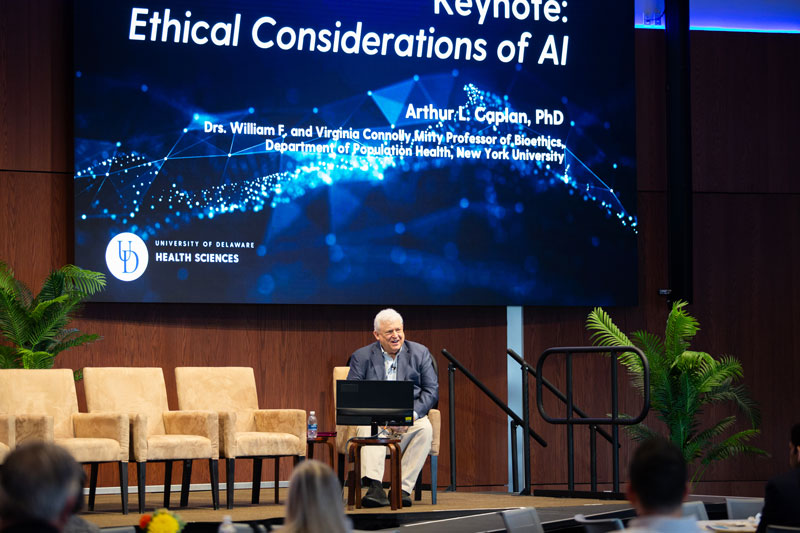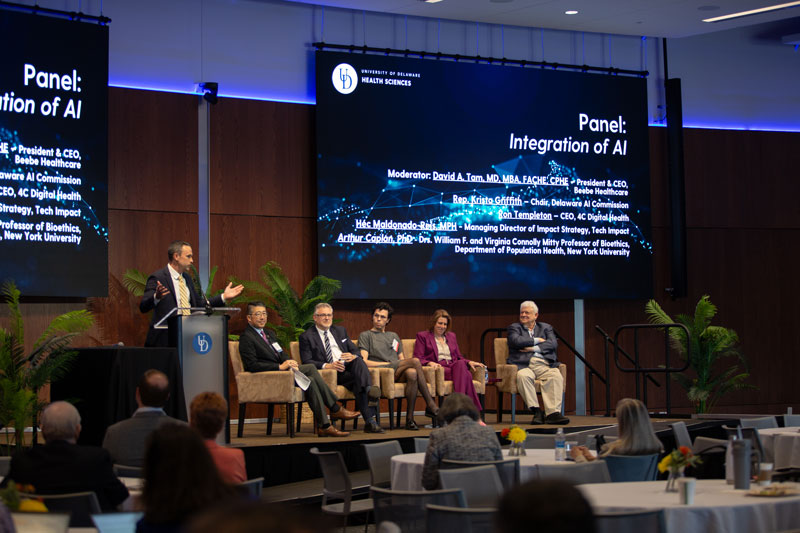
Category: College of Health Sciences
Stern Summit Spotlights Healthcare’s AI Revolution
May 09, 2025 Written by Amy Cherry | Photos by Kristen Troy
AI is healthcare’s ‘Blockbuster moment’
Artificial intelligence (AI) may outperform the average human in many tasks, but can't replace the human touch. Still, healthcare workers and educators must grapple with how to adapt to this rapidly evolving technology.
That was the central message at the Stern Future Healthcare Workforce Summit held May 2, 2025, on the University of Delaware’s Science, Technology and Advanced Research (STAR) Campus.
Dan Weberg, executive director of workforce development and innovation at Kaiser Permanente, called AI a “Blockbuster moment” for healthcare—a critical inflection point where failure to adapt could mean becoming obsolete.
“We have a chance right now, like Blockbuster did, to double down on the past or boldly build the future, and AI is part of that,” Weberg said. “I don't think AI will take our jobs anytime soon, but it is an enhancement, and rewinding is not the way to go.”
The summit, hosted by the College of Health Sciences and funded through the generous support of UD College of Arts and Sciences alumni Andrew M. Stern, Class of 1970, and Sabina Bobzin Stern, Class of 1971, brought together experts, educators, students, and clinicians to discuss the role of AI in educating the future healthcare workforce and transforming patient care.
“We’re living through a transformational moment,” said CHS Dean Bill Farquhar. “AI is already shaping the way we deliver care, the way we learn, and the way we must prepare the next generation of health leaders here at CHS.”
The transformative technology is already revolutionizing healthcare delivery.
“AI can aid in more accurate diagnoses. Real-time insights can provide personalized care plans and aid in the timely identification of patients’ conditions,” said Andrew Stern. “AI will ultimately help clinicians design targeted, personalized treatment plans that will save lives at the bedside.”
AI in Healthcare & Clinical Education
Keynote speaker Alex Goryachev, a globally recognized expert on AI and innovation, called AI the most significant shift in our lifetime. But he also emphasized, “We’ve seen this change before.”
From the Industrial Revolution to the invention of electricity, computers, and the internet, resistance rooted in fear has always surrounded innovation.
“During this AI revolution, there’s a lot of discussion about what’s going to happen to jobs and the workforce,” Goryachev said. “We’ve had to reinvent ourselves over and over again, but what’s different this time is that the change is happening at a completely different magnitude; it’s much faster, much more profound, and has far bigger implications.”
He pointed to the launch of ChatGPT in 2022 as a pivotal moment. It took Netflix four years to get one million users, while ChatGPT achieved that milestone in five days.
“It’s the fastest-adopted technology in the history of the world,” said Goryachev. “And yet, less than 10% of people on the planet are using AI.
“Some people are afraid of it; others are enamored by it,” he said. “We must overcome the resistance and build schools for the future that are prepared for this revolution and that foster skills like analytical and critical thinking, emotional intelligence, leadership, and adaptability.”
But one element AI lacks that’s key to compassionate care: empathy.
“The healthcare industry is experiencing shortages, and more and more people need medical care,” said Goryachev. “It’s not about cutting people, it’s about reinvestment, innovation, and retraining people.”
However, despite its lack of empathy, in a Harvard Business Review study, people reported using AI most for therapy and companionship.
“Twenty years ago, some believed social networks would bring us more connected; they made us more lonely and isolated,” Goryachev cautioned.
“AI is an extremely powerful tool, but must be handled carefully. It's three years old, and we must innovate ethically, lawfully, and responsibly.”
Using AI to Optimize Clinical Workflow
Keynote speaker Dan Weberg, executive director of workforce development and innovation at Kaiser Permanente, discussed the potential and challenges of AI in healthcare, emphasizing its role in enhancing—not replacing—clinical roles.
He cited a national study of nurses conducted by The Ohio State University, which revealed that many nurses spend a significant amount of time on administrative work that takes them away from patient care. The study also found:
· 50% said they had worsening health
· 29% had clinically relevant depression symptoms
· 37% reported anxiety
“That's the promise of AI—to enhance the workflows of clinicians who need to be with patients, not in front of computers,” said Weberg.
However, Weberg cautioned that while technology solutions cannot replace licensed professionals, there is a need for stronger integration of AI in medical and professional education.
“We have more accurate tools that can give us insights to guide clinical decisions. If we ignore them and rely only on what we can see, touch, or feel, we’re missing the boat,” said Weberg. “AI should be embraced as another source of evidence, not something that replaces clinicians or critical thinking. Evidence-based practice is one of the foundations of clinical education, and AI must be part of that framework.”
He highlighted success stories of AI-enabled care in remote monitoring and personalized patient care plans, where AI-enabled alerts and home-based care have improved patient experiences and outcomes.
“We have to challenge the idea that the system isn’t broken—because it is—and we must start thinking about incorporating AI technology as a core to our clinical practice,” said Weberg. “Healthcare systems should build and test these models to enable a better patient experience because if we don’t lead this integration, Apple, Google, and Amazon will.”
The Ethical Considerations of AI
Keynote speaker Arthur Caplan, Drs. William F. and Virginia Connolly Mitty, Professor of Bioethics in the Department of Population Health at New York University, led a thoughtful discussion on AI ethics and data privacy.
“AI is omnipresent…whether it’s our cellphones, online shopping, or the information collected about us when we visit a health facility,” said Caplan.
AI is already deeply embedded in personal health, from wearable devices like Fitbits and Apple Watches to tools that assist with diagnostics.
“There isn’t a person on Earth who doesn’t use Google to diagnose their symptoms, and 92% of chatbot diagnoses done on OpenAI were more accurate than physician diagnoses.”
Caplan said AI now supports clinicians at NYU in reading diagnostic imaging like CT and PET scans.
“AI has a better ability to read images than the human eye; it’s more precise. It doesn’t come into work tired; it works 24/7 and doesn’t take holidays, making it attractive to health systems,” he said.
But the effectiveness of AI depends on data, and that data, he warns, is deeply biased.
“The personal healthcare data AI is working with leans white, male, and wealthy,” said Caplan. “If we don’t fix that, there won’t be accurate and equitable diagnoses or precision medicine. “
Caplan also warned about the risks of unregulated AI.
“If we don’t regulate AI in personal health delivery, there will be trouble,” he cautioned. “We need national and international privacy and consent protection standards.”
He called on private companies to set standards if the federal government will not.
“We’re at a turning point,” Caplan said. ‘It's time to take some action if we're really going to ensure that this tool serves us rather than discovering that we're in service to those who own or control it.”
The Stern Summit also featured case studies on AI-driven clinical innovations from ChristianaCare, Nemours, and Bebee Healthcare, as well as a panel discussion on AI integration, which was moderated by David Tam, president and CEO of Beebe Healthcare, and featured panelists: Ron Templeton, CEO of 4C Digital Health; Héc Maldonado-Reis, managing director of impact strategy for Tech Impact; State Rep. Krista Griffith, chair of the Delaware AI Commission; and Arthur Caplan, Drs. William F. and Virginia Connolly Mitty, Professor of Bioethics in the Department of Population Health at NYU.
“It's easy for generational educators to pull back and see AI as futuristic,” said Andrew Stern. “But the message from our keynote speakers is clear: we must continue integrating AI into clinical practice and invest in AI education. It’s critical that students gain early exposure to AI, so they understand the practicalities and downsides in clinical practice.”

